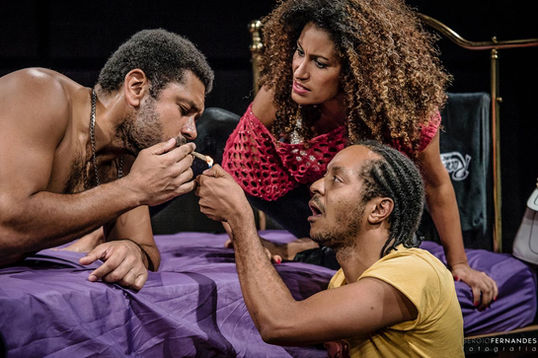JOSÉ FERNANDO PEIXOTO DE AZEVEDO
SHOWS IN CIRCULATION
The Dirty Hands (2019)
Natural History of Love (2019)
Razor in Black Meat (2018)
Waiting Shed (in production)
Nora Black (in production)
Click on the photo for more information.
José Fernando Peixoto de Azevedo deals with theater, cinema, and philosophy. He has written and directed plays and films, acted as a professor of theories and history of theater, dramaturgy and acting, and made incursions into the universe of curatorship. He is professor and currently director of the School of Dramatic Art and advisor in the Post-Graduation Program in Performing Arts at the School of Communications and Arts at the University of São Paulo, where he also taught at the Cinema Department. He also collaborated in the dramaturgy area at SP Escola de Teatro. He has a doctorate in philosophy, with a thesis on Bertolt Brecht's theater, under Paulo Eduardo Arantes' supervision, from the Philosophy Department of the School of Philosophy, Literature, and Human Sciences at USP, where he graduated. Before that, he studied cinema at FAAP. Between 1997 and 2016, he was director and playwright of Teatro de Narradores, a group he founded and in whose context he carried out a trajectory of both training and establishing a perspective of work that took shape in stagings such as Mercado de Fugas (2000), Nossa Casa de Boneca (2005), A resistível Ascensão de Arturo Ui (2003 and 2013), Retrato Calado (2013) and the cycle Cidades - Cidade Desmanche (2009), Cidade Fim Cidade Coro Cidade Reverso (2011), Cidade Vodu (2016). The Brazilian social experience and its position in the world, from a dialectical viewpoint that inscribes artistic practice in the processes of configuration of such experience, define, in part, his work perspective, imbricating theater and cinema in the materiality of the scene, always returning to an alliance with Brecht and Glauber Rocha, decisive references. But it was the encounter with the work of Pier Paolo Pasolini, which resulted in two works - Pílades (2010) and Estamos todos em perigo (2016), the latter also as a performer - that led to an inflection in his work program, reflecting on other ways of questioning the process of conservative modernization in Brazil. A program that had already been reshaped after meeting with the group Os Crespos, when that social dimension was put into perspective, now in a programmatic way, by the questioning of the relations between class and race. With Os Crespos he wrote and directed Ensaio sobre Carolina and Além do Ponto; he also wrote Carta a Madame Satã ou me despero sem notícias seus and supervised the staging of Alguma coisa a ver com uma missão. This program continues in stagings such as Razor in Black Flesh (2018), Dirty Hands (2019), and Natural History of Love (2019). He has had works nominated and contemplated by several awards and funding programs, such as the Programa de Fomento ao Teatro para a Cidade de São Paulo, Prêmio Cooperativa Paulista de Teatro, Prêmio Shell, Prêmio APCA, and his works have integrated the programming of several festivals around the country. As a curator, he has acted in several institutional contexts, such as Festivals and Exhibitions (MITsp and FIT Rio Preto, for instance). His film Também é sobre isto is in its conclusion phase, while he is preparing the script for Extinção. In short: In the Portuguese spoken in Brazil, to say "there is a body" means "there is a corpse". If this is so, what makes a body a subject? What can art still do from bodies, with bodies?










